"Nothing is pornographic in the film, because it achieves ecstasy,
and ecstasy is sacred. Nothing in love is obscene, now. That was
a new idea. Absolutely. No one had ever done it before." |
Catherine Breillat, director of À Ma Soeur! and Sex is Comedy |
"Do what you please. My body is yours forever." |
Ishida Kichizo to his lover Abe Sada |
At the risk of offending those who profess some sort of moral or religious purity, I have to confess that the very idea of refusing to engage in sexual activity until after your relationship has officially been blessed by church or state has always struck me as a little absurd. Sex is a force of nature, and should not be the subject of social convention or control. It all comes down to basics. Strip the meaning of life of its philosophical trimmings and you're left with one thing: the genetic compulsion to propagate the species.
The survival of humankind is reliant on our programmed desire to copulate and reproduce. For all breeds of animals – and yes, that includes us – sex is not just a pastime, it's the driving biological force of existence. And yet we continue to be embarrassed about it, inventing endless euphemisms to dance around the biological terminology, and confining discussion on such matters to confidential chats with close friends or trusted members of the medical profession. It's something you don't talk about when you go on a first date, but if the evening goes well then a couple of weeks later there's a good chance you'll be at it like proverbial rabbits. Sex is the heroin of human biology, and like all class A drugs the quality will inevitably vary, but match the right user with the right product and you've got the recipe for a serious addiction. Even when relationships settle down and become based more on comfort and familiarity than time spent in the bedroom, sex remains a measurement of the stability of the bond (as in "when was the last time we actually slept together?" and so on), and if and when a relationship starts to sour, it's the idea that a partner might be sleeping with another that remains the biggest single trigger for jealousy, anger and unreasonable violence.
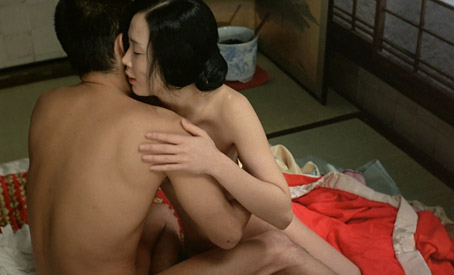
Ai no korīda (literally "Love's Bullfight", but released in the UK as the rather poetic In the Realm of the Senses) is a film that explores this concept in explicit detail, and I do mean explicit. If you're new to the title and somehow unaware of its reputation, then do not be misled by its 1976 release date and try to measure it by adult themed Hollywood output of the period. This is a film about sexual obsession and its ultimately destructive consequences, and none of the sexual activity here has been simulated. And there is a lot of sexual activity in this film. Thus if you're embarrassed or offended by the sight of on-screen sex then you might want to give this one a rather wide berth. On second thoughts watch it, and while you're shifting in your seat and unsure where to look, ask yourself what it is that so embarrasses or offends you about this natural and enormously pleasurable act.
The setting is 1936 Tokyo, and ex-prostitute Abe Sada (Matsuda Eiko) lands a job at an inn owned by Ishida Kichizo (Fuki Tatsuya), who sexually serves his wife at the same time each evening, the sight of which has an unexpectedly strong emotional impact on the secretly watching Sada. The very next day Sada is teased and molested by Kichizo, which she does little to resist, and the two subsequently embark on a passionate affair. Posing as newlyweds, they move to a hotel, where they immerse themselves in a lifestyle of hedonistic sexual experimentation, but as Sada becomes more possessive, her pursuit of extreme pleasures takes the pair into increasingly dangerous territory.
There's been a long standing debate on the difference between pornography and art, one amusingly if superficially summarised by Billy Kwan in The Year of Living Dangerously as "if it's in focus it's pornography, if it's out of focus it's art." Ai no korīda is most definitely in focus (especially on this rather splendid looking release), but it would be hard to make a convincing case for what unfolds here as pornography, a genre whose sole purpose is to provoke arousal for the purpose of sexual (self-) gratification. It seems likely, however, that its reputation on this score was the key reason for its record number of screenings at Cannes and its under-the-counter popularity on UK VHS. But in spite of its explicit content, it has a tone and structure that, while undeniably erotic, effectively nullifies its potential as a masturbatory aid (an open-minded friend of mind who caught in on VHS in the early 80s even expressed some disgust at the couple's games with food, a reaction I've never been able to comprehend). As an innocent young viewer in a pre-internet age I was certainly rendered wide-eyed by what I encountered, but also found myself gripped by the passion and ultimately tragic nature of the couple's affair. In a film that explores the pursuit of the extremes of sexual pleasure, it seems only right that the sex should be as frank and unapologetic as the two central characters, and as an adult I'm far more receptive to the increasing risks they take in pursuit of the ultimate pleasure.
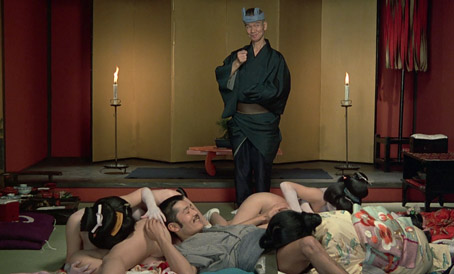
Early in their affair, Sada and Kichizo's passion reflects that of any young couple who are hot for each other, but by the time they are ensconced in the hotel, where they indulge their obsession to the exclusion of all else, the drug addiction metaphor is impossible to ignore. In a state of dazed disconnection with the outside world and rarely leaving their increasingly untidy room, their only real concern is getting their next fix, and their wanton behaviour becomes the subject of scandal amongst the hotel staff. By then the relationship has taken a darker turn, with Sada's possessive paranoia and determination to push the limits of the sexual expression walking an increasingly dangerous line between pleasure and potentially lethal physical harm. This culminates in the couple's experiments with erotic asphyxiation, but is foreshadowed by Sada's early daydream of slashing Kichizo's wife's throat and the threats she makes while brandishing a knife or holding it to her lover's genitals.
It's this aspect that will play differently to a non-Japanese audience, or at least one unfamiliar with the real-life case on which the story is based (and if you wish to watch the film without the foreknowledge of the facts to which it largely adheres, then I'd skip forward a paragraph). At the time of the film's release, the story of Abe Sada was still well known in Japan, and the average Japanese viewer would thus be well aware how it ended. Sada's fame stems largely from the manner in which her relationship with Kichizo concluded (last chance to look away), when she strangled her lover in an apparently consensual act of erotic asphyxiation, then cut off his penis and testicles, which she carried around in her handbag until her eventual arrest. Despite her claim that she desired the death penalty, she was sentenced to just six years in prison and was released after five. The police record of her interrogation, published in 1936, became a national best seller, as did writer Sakaguchi Ango's 1947 reworking of the same, The Erotic Confessions of Abe Sada. In response to this book, for which she was never actually interviewed, Sada wrote the autobiographical Memoirs of Abe Sada, which focussed on her devotion to Kichizo and led to her being admired as an icon of total love.
The authenticity of the film's sexual content is echoed in how closely it adheres to the known facts and Sada's account of what took place between her and Kichizo, right down to the wording of key conversations. But a straightforward biographical drama this is not, with almost every scene infused with a potent thematic layering, some of which is open to multiple interpretations. In a quietly memorable and much quoted example, a platoon of soldiers march past flag-waving locals while Kichizo idles down the street in the opposite direction without giving them a glance. It's easy to read this as a contrary action on Kichizo's part, a man who has given his life over to love walking in the opposite direction to men who are heading off to war. But it's left to the audience to decide whether his downcast expression is a guilt-driven response to the presence of the soldiers, his shame at having abandoned his family, his pain at the temporary absence of his lover, or a concern about the direction their relationship is taking.
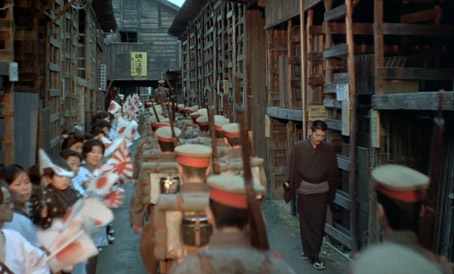
Some have even seen film itself as a revolutionary act on the part of its celebrated director (and former student radical) Ōshima Nagisa, an open challenge to censorship in what Ōshima himself has called "a country which represses sexuality and refuses to admit that women are sexual beings." Although filmed in Kyoto, Ai no korīda was officially categorised as a French production and the shoot itself was conducted under conditions of secrecy. The exposed negative was quietly shipped to France for processing, where the editing and post-production work was also completed. At the film's Japanese premiere, all of the explicit sexual activity was optically censored, and to this day the film has not been screened in Japan in its uncensored form. Then again, Japanese censorship laws are a peculiar beast, permitting the on-screen presentation of all manner of sexual activity but forbidding the display of pubic hair or genitalia. Thus if you should happen to find yourself in a Japanese love hotel (give me a break – they're really cheap and have good sized rooms) and switch on the TV, you'll be greeted by an unbroken stream of hardcore pornography, but with the very bits that mark it as hardcore in the first place hidden behind a blur or a digital mosaic.
One of the liberating aspects about Ai no korīda is precisely that it is so frank and unembarrased about its its portrayal of sexual activity, which has the effect of stripping its graphic presentation of its shock value and cheap titillation, transforming it into the natural and everyday expression of passion and love that it by all rights should be. Sex here is sensual and consensual, demanding and rewarding, and so all-encompassing an expression of the couple's feelings for each other that those close to them sometimes fall under its infectious spell. Despite where it ultimately takes the two lovers, sex is never shown to be harmful in itself – in the end it's not the drug that destroys the couple, but the nature and intensity of their shared addiction.
It's been a long road from the grubby VHS transfer that for many of us was our first encounter with Ai no korīda. The picture on the Blu-ray in this dual format set (I've not yet seen the DVD so cannot comment on it) has clearly undergone some careful restoration and for the most part looks rather lovely, having well-balanced contrast, rich (but not over-saturated) colours and a impressive sharpness and picture detail. There is a slight softening of contrast in some darker scenes, but only to preserve picture detail that more solid black levels might otherwise have swallowed, while a colour integrity slip in one scene suggests that more than one source was used for the restoration. There is some minor flickering in places and grain is visible if you get too close to the screen (and just why would you be doing that?), but the picture is remarkably clean, with almost no sign of dust spots or scratches. This is far and away the best I've seen the film look.
This is, it should be noted, the first time the film has been passed by the BBFC with no cuts or alterations. Previously a sequence in which Sada grabs the penis of a naked young boy who is playing with his sister was previously removed in its entirety, though was later re-instated with the frame enlarged so that the act itself was not shown.
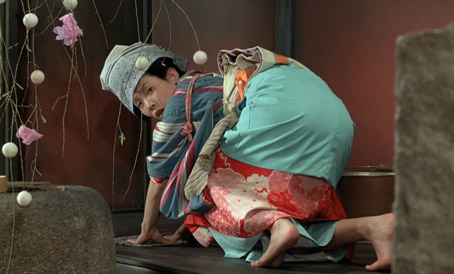
The DTS-HD Master Audio 2.0 mono track may not have the wide tonal range of a more modern film, but this is still a very clear track with no distortion or background hiss to contend with.
Once Upon a Time… In the Realm of the Senses (52:14)
Part of a series titled A Film and its Era, this 2010 documentary by David Thompson is a wonderfully detailed and comprehensive look back at the film, its production, the true-life case on which it was based, and the controversy surrounding its worldwide release. Newly shot interviews with filmmakers, critics and some of those involved in creating the film (including head of production and pink film grand master Wakamatsu Kōji, and lead actor Fuki Tatsuya) alternate with behind-the-scenes footage of the film's production, an on-set interview with Ōshima and press interviews from the time of the film's release. Just about every angle you could hope for is given good coverage, with the level of research extending to include the real Abe Sada's only film appearance and a police crime scene photo of the grisly results of the act for which she achieved national notoriety. The information provided about subsequent public hostility towards actress Matsuda Eiko is deeply saddening, while the news that the only thing the Japanese authorities could prosecute Ōshima for (as a French production, the film itself was not bound by Japanese obscenity laws) was including stills from the film in the published screenplay makes their continued refusal to allow it to be shown uncut seem all the more absurd. An excellent, illuminating and thoroughly engrossing companion to the main feature.
Recalling the Film (38:40)
Some of those involved in the making of the film – most if not all of whom were also interviewed for the above documentary – recall the process of getting Ai no korīda made and their involvement in it. Inevitably there is some crossover with Once Upon a Time, but there are still plenty of stories new to this featurette, including the mess that resulted from not boiling a certain egg for the required amount of time (if you've seen the film you'll know just what that means), the casting sessions that revolved around actors' ability to achieve and maintain an erection in front of the camera, and assistant director Sai Yôichi's suggestion that Wakamatsu Kōji was once a yakuza.
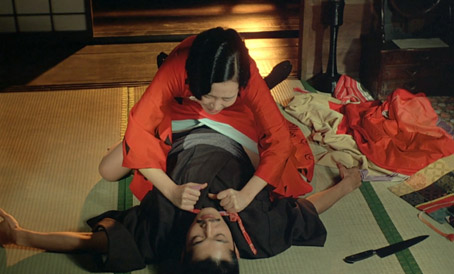
Panel Discussion at Birbeck College (57:01)
A cross-cultural round-table discussion about the film shot at London's Birkbeck College, involving film historian Julian Ross, Behind the Pink Curtain: The Complete History of Japanese Sex Cinema author Jasper Sharp, and Japanese film scholars Roland Domenig and Mathieu Capel. Fortunately the discussion is nowhere near as dry and academic as it probably sounds, with the four recalling how they first encountered the film and discussing its linking of sex and politics, the attempt to prosecute Ōshima and the publisher of the book of the film, the various cuts and versions shown around the world, and a good deal more. It's an interesting chat that although doubles up on some previously covered ground, has enough new material to be well worth a watch.
Deleted Scenes (12:19)
Those with an eye on the technical details may have noticed that the running time of this uncut Blu-ray is actually 6 minutes shorter than the original 108 minute cinema release. This is the result of an early recut carried out (with Ōshima's permission) by producer Anatole Dauman, resulting in the 102 minute version that has for some time been the standard video release version. You can find a detailed list of the differences between this version and the 108 minute cut here, and all of the cut footage is included in this section – the 12 minute running time includes non-deleted material to illustrate how the each sequence originally played with the scenes they were removed from. The picture breaks up badly in places here – I'm assuming this is an issue with the review disc only.
Thirty-six years after it was first unleashed, Ai no korīda is still one of the most honest and explicit explorations of the sometimes overwhelming intensity of the human sexual experience. It's also a compelling and surprisingly faithful recreation the events that led up to an incident whose fame lingers on to this day in Japan. It has earned its place in cinema history as one of the first widely seen films in which the sex was not simulated and yet which suffered only minor cuts in countries where such scenes would normally have not been passed. StudioCanal have done the film proud here, with a polished transfer and over two-and-a-half hours of worthwhile extra features. It's also the first time this version has been made available uncut in the UK. Highly recommended.
The Japanese convention of surname first has been used for all Japanese names in this review.
|